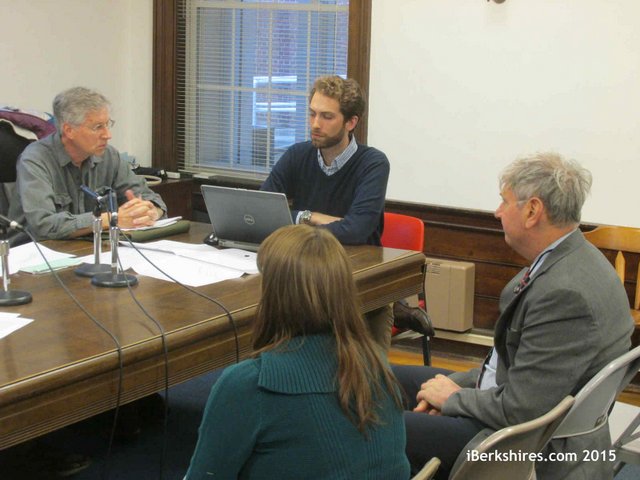Williamstown Con Comm to Address Waubeeka Order on Thursday
 Waubeeka owner Michael Deep and Megan Myers, a wetlands scientist at Guntlow & Associates, appear before the commission in April. Waubeeka owner Michael Deep and Megan Myers, a wetlands scientist at Guntlow & Associates, appear before the commission in April. |
WILLIAMSTOWN, Mass. — The Conservation Commission at its Thursday meeting hopes to finalize an
enforcement order against Waubeeka Golf Links requiring it to restore vegetation along the bank of the Green River.
At its last meeting on April 23, Waubeeka owner Michael Deep made his second straight appearance before the commission, this time bringing some preliminary plans to replace trees and shrubs clear cut along the river.
Commissioners expressed concern with the initial plan and decided to wait for input from Massachusetts Natural Heritage and Endangered Species Program before drafting an order.
"It's not complete yet," said Megan Myers, a wetlands scientist at Guntlow & Associates who represented Deep before the commmission. "We need to hear from Natural Heritage to see what input they have on the plan before we we finalize it.
"We had chosen a list of shrubs and saplings that is open to suggestions to see if you guys like that list or if you'd like me to change it."
Commissioners expressed concern over the use of herbicides during the replanting. Myers said any treatments would be approved by Natural Heritage, a division of the commonwealth's Office of Energy and Environmental Affairs.
Commissioner Henry Art, a professor of environmental studies and biology at Williams College, said herbicides, in this case, may be preferred but would need to be applied carefully.
"Herbicides in treating invasive exotics sometimes are a necessary evil," Art said. "Often they are painted on laboriously and covered in plastic [to prevent runoff]."
The presence of invasive species along the river bank led to the the cutting that got Deep in hot water with the commission.
Last spring, he asked the commission about removing some of the invasive plants, but the panel never received or approved a formal plan. This year, the commissioners, while on a site visit to review another project at the course,
discovered that the banks had been clear cut, which both removed native plants and exposed the river to excessive sunlight, threatening aquatic life.
At the April 23 meeting, Art said he did not feel there was enough detail in the preliminary plans presented to the commission, and he had problems with the details he saw.
 Commissioner Henry Art looks at preliminary plans to revegetate the banks of the Green River. Commissioner Henry Art looks at preliminary plans to revegetate the banks of the Green River. |
"We need to know the native species that were cut," Art said. "We need to have the locations and — to the extent it's identifiable — the identities of the large species that were cut in order to assess if the planting schedule is going to be specific.'
Art and Chairman Philip McKnight questioned whether the 3-foot saplings identified on the preliminary plan would be sufficient to shade the river.
"I'd prefer something larger than 3-foot high red maple," Art said. "It might grow another foot in that first year, but probably something 5- to 6-feet high would be better.
"I think we should request that, under the circumstances of the kind of disturbance created here, that we have plant material on the larger side rather than the smaller side."
As for the project that brought the commission to Waubeeka this spring, the dredging of a pond and repair of an existing dam, that project is on hold after the town learned that Department of Environmental Protection had rejected the order of conditions OK'd by the commission.
The commission will take up the enforcement order again at its May 14 session.
Tags: conservation commission, golf course, wetlands,
 Waubeeka owner Michael Deep and Megan Myers, a wetlands scientist at Guntlow & Associates, appear before the commission in April.
Waubeeka owner Michael Deep and Megan Myers, a wetlands scientist at Guntlow & Associates, appear before the commission in April. Commissioner Henry Art looks at preliminary plans to revegetate the banks of the Green River.
Commissioner Henry Art looks at preliminary plans to revegetate the banks of the Green River.














